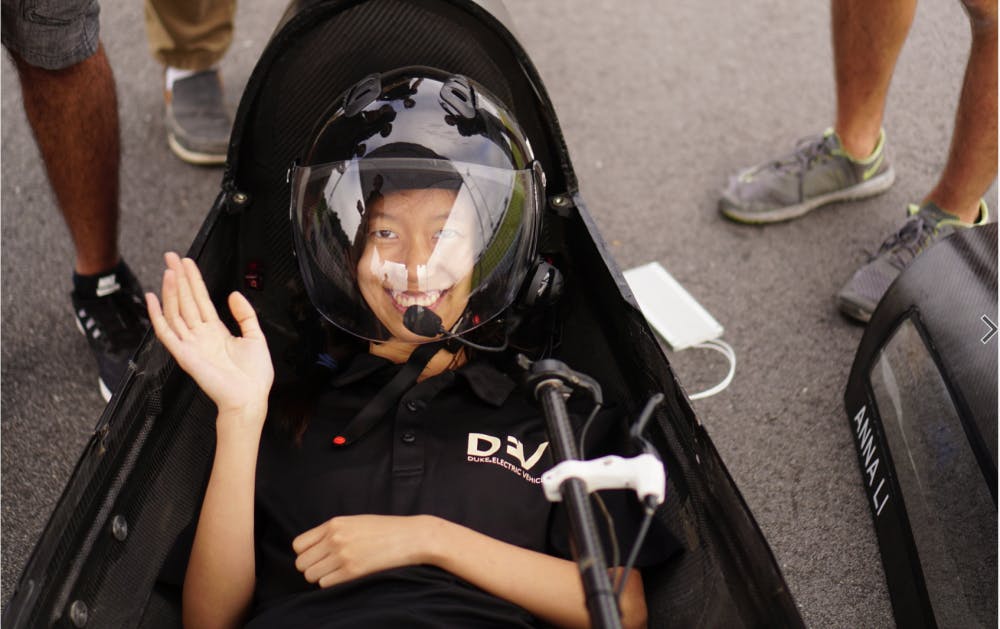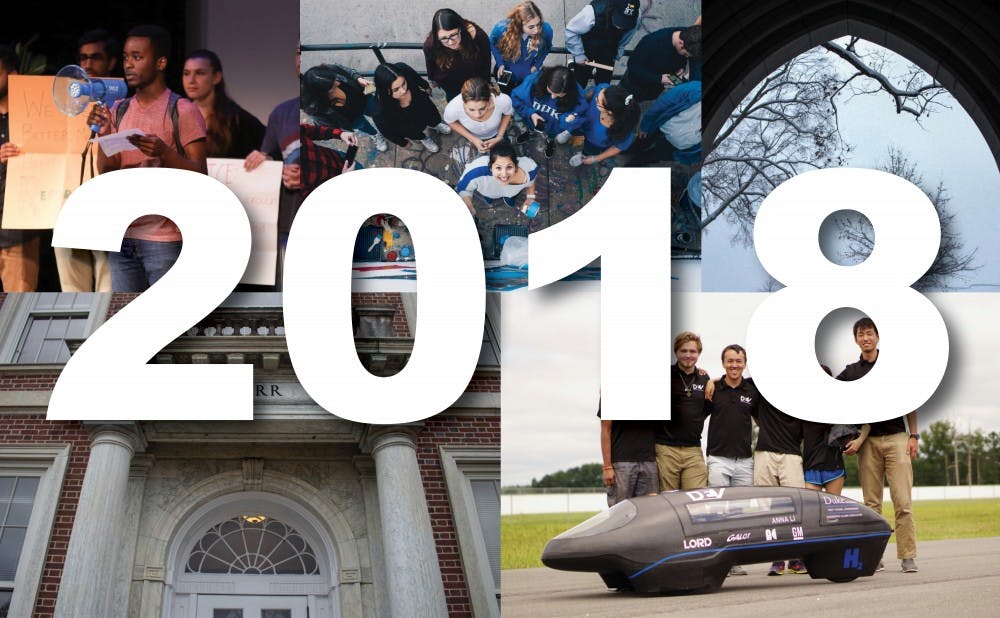As 2018 draws to a close, The Chronicle looks back on the stories that shaped life at the University during the last twelve months. Ranging from record-setting performances to faculty addressing the topic of harassment, these are stories that defined 2018.
Carr Building renamed
In December, Duke’s Board of Trustees removed the Julian Carr's name from the academic building on East Campus that bore his name for nearly 90 years. Until a new name is chosen, it will be known as the Classroom Building. Carr, a philanthropist who donated the land that East Campus sits on, was known for racist rhetoric and endorsing the Ku Klux Klan's violent tactics.
The change comes four years after Duke pulled former North Carolina Governor Charles Aycock’s name off an East Campus residence hall due to Aycock’s racism. To remove Carr’s name, the University followed a formalized process enacted by President Vincent Price based on committee recommendation after he had the Robert E. Lee statue removed from the Chapel steps.
After a formal request was submitted by the History Department, which is housed in the former Carr Building, an ad-hoc committee was formed to evaluate the request and make a recommendation, which Price presented to the Board.
Racially charged incidents strike campus
Since the beginning of 2018, many racially charged incidents have been reported on campus. The Southern Poverty Law Center told The Chronicle it follows a national trend on college campuses.
In January, the residence coordinator for first-year dorm Bell Tower emailed students saying that a black female student had reported two men saying “F*** you, n*****” to her. At the end of the Spring semester, the words “n***** lover” were found painted on a student’s door at 300 Swift apartment complex shortly after screenshots of Snapchats from a student that included captions with racist language were posted on Facebook's Duke meme page. A couple days before the beginning of Fall semester, the Mary Lou Williams Center for Black Culture sign was found defaced with the word “n*****” inserted over the word “Black.”
In September, a Latinx Heritage Month mural was defaced a day after it had been painted by students. The next day, a man approached the students and said that he had painted over the art but not realized it was a mural.
In mid-October, a student reported finding a swastika carved into the stall door in a bathroom in the Languages Building. The day after Halloween, a swastika carved into a pumpkin and flyers saying “It’s okay to be white” were reported on East Campus.
In November, a large red swastika was found painted over a mural that students had painted to memorialize the victims of a Pittsburgh synagogue shooting. A few days later, stickers for the white nationalist group “Identity Evropa” were found in multiple areas on campus.

Duke Electric Vehicles sets world record
A team of Duke students spent their summer breaking a Guinness World Record. The Duke Electric Vehicles Club engineered the world’s most fuel-efficient vehicle, using a hydrogen fuel cell and more than a thousand hours of work.
The team set the record on July 21, when their car—which weighs only 50 pounds—traveled for 30 minutes at an equivalent of 14,573 miles per gallon.
“I remember thinking that beating this record was the mountain no one thought they could climb,” said Patrick Grady, Pratt ’18 and then-president of the club.
Administrative changes
Several academic leaders and administrators changed roles or announced impending departures this year.
Larry Moneta, vice president for student affairs, announced in August that he would retire from his role at the end of the school year. Additionally, Ben Reese, vice president for institutional equity, announced that he would step down at the end of the 2018-2019 academic year.
Phail Wynn, formerly vice president for Durham and regional affairs, stepped down during the summer from the post after a decade on the job, handing over the reins to Stelfanie Williams, Trinity ‘98 and previously the president of Vance-Granville Community College. Additionally, Steve Nowicki, formerly vice provost for undergraduate education, stepped away from his post to return to teaching and was replaced by Gary Bennett, founding director of Duke’s undergraduate major in global health.
Judith Kelley replaced Kelly Brownell as the dean of the Sanford School of Public Policy, and Toddi Steelman replaced Jeffrey Vincent as the dean of the Nicholas School of the Environment. Kerry Abrams took over from David Levi as dean of the School of Law. Elaine Heath’s departure as dean of the Divinity School was announced suddenly and went into effect immediately in August. Heath was replaced by Greg Jones.
Harassment in academia
As the #MeToo movement continues nationally, questions regarding harassment within academia arose on campus.
In February, The Chronicle reported about the experiences of students who had dealt with sexual harassment in the classroom, and in April about a former Duke professor who was found responsible for sexual harassment in the workplace and subsequently hired by the University of Maryland. After The Chronicle’s reporting, Maryland removed the professor from teaching.
Duke’s Academic Council has also been looking into the issue. In the Spring, the Council passed a proposal to ban consensual sexual or romantic relationships between faculty and undergraduates and to restrict such relationships between faculty and graduate students. The Council spent the Fall semester discussing harassment in the academic workplace and how to combat it. Incidents such as a professor locking students in a lab and another throwing a bottle at a graduate student were cited.
“When these cases finally come to us, common findings are [the faculty's] incredible lack of insight about their role in the problem,” said Ann Brown, vice dean for faculty at the School of Medicine.
Student health insurance changes rolled back
The Chronicle reported in October that students on financial aid whose calculated parent contribution was above zero had been told the University would no longer pay for their health insurance. Following student leaders’ push to reinstate the health care coverage, President Vincent Price announced in a letter to the editor that the administration was rolling back the planned change.
"Student reaction to the proposed health insurance change was an important factor in the reversal of the policy," wrote Michael Schoenfeld, vice president of public affairs and government relations.

Midterm elections and students voting
With 2018 came the national midterm elections, in which the Democrats regained control of the House of Representatives while the Republicans held the Senate.
The election saw several Duke alumni win congressional offices, as well as J.B. Pritzker, a member of Duke’s Board of Trustees, who won the Illinois governorship. Dan McCready, Trinity ’05, lost the race for North Carolina’s ninth congressional district by less than 1,000 votes, a competition that has drawn national attention because of allegations and investigations into voter fraud.
On campus, there was a push to get students to the polls. Duke Votes, a non-partisan group formed to push voting on campus, launched and held a Party at the Polls. An early voting site returned to the Brodhead Center for the election, and it saw a record-breaking number of ballots cast for an on-campus polling site.
Housekeepers' shifts
The Chronicle reported in September that housekeepers' shifts would be changing, and that they would now have to work during the weekends in order to keep the dormitories clean. The change sparked a student petition.
Shortly after, The Chronicle reported that housekeepers had been informed that they would have to re-bid for their shifts and locations based on seniority, and that their union president was resigning in protest to the changes.
Shortly after the re-bidding process was completed, administration notified the housekeepers in October that they would not implement the new shifts and locations they had bid for following pushback.
Duke ties for most Rhodes Scholars with three
The University tied with Princeton and Yale this year for the most Rhodes Scholars, win three seniors winning the prestigious honor. Ariel Kantor, Claire Wang and Kushal Kadakia were announced as winners of the scholarship in November, bringing the number of Duke winners to 49 total.
The elite scholarship, given to 32 U.S. college students annually, pays for the full cost of a graduate degree at Oxford University.
Get The Chronicle straight to your inbox
Signup for our weekly newsletter. Cancel at any time.

